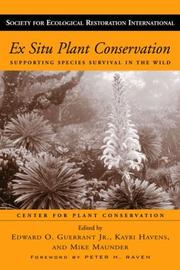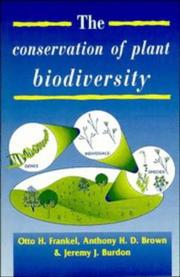| Listing 1 - 10 of 51 | << page >> |
Sort by
|
Book
ISSN: 20596936 ISBN: 9781786764515 9781786764539 1786764539 9781003180623 1003180620 9781786764546 1786764547 1786764512 Year: 2021 Volume: 100 Publisher: Cambridge: Burleigh Dodds science,
Abstract | Keywords | Export | Availability | Bookmark
 Loading...
Loading...Choose an application
- Reference Manager
- EndNote
- RefWorks (Direct export to RefWorks)
"This collection addresses the challenges of maintaining and benefitting from plant genetic diversity. Part 1 assesses ways of valuing and monitoring plant genetic diversity. Part 2 discusses advances in in-situ and ex-situ strategies for conserving plant genetic diversity. The final section reviews ways of enhancing the use of plant genetic diversity for a more sustainable agriculture."--

ISBN: 128172209X 9786611722098 0300130147 9780300130140 0300100493 9780300100495 Year: 2004 Publisher: New Haven : Yale University Press,
Abstract | Keywords | Export | Availability | Bookmark
 Loading...
Loading...Choose an application
- Reference Manager
- EndNote
- RefWorks (Direct export to RefWorks)
Biological diversity is as crucial in agriculture as it is in nature, and it is equally important to the economic health of both industrial and nonindustrial societies. This book offers a sweeping assessment of crop diversity and the potential for its preservation. Stephen B. Brush develops a framework for investigating biological diversity in agriculture that focuses on the knowledge and practice of farmers, and he shows how this human ecology perspective can be applied to three global issues that affect crop resources. Brush defines the dimensions of crop diversity and outlines the essential questions surrounding it. He describes the techniques used to maintain diversity in major crops of three cradles of agriculture in which he has worked: potatoes in the Peruvian Andes, maize in Mexico, and wheat in Turkey. Finally, he explores the policy issues surrounding genetic erosion of crop varieties, conservation of crop diversity, and ownership of genetic resources.

ISBN: 1597267562 1423765524 9781423765523 9781559638753 1559638753 9781559638746 1559638745 9781597267564 Year: 2004 Publisher: Washington, DC : Island Press,
Abstract | Keywords | Export | Availability | Bookmark
 Loading...
Loading...Choose an application
- Reference Manager
- EndNote
- RefWorks (Direct export to RefWorks)
Germplasm resources, Plant. --- Plant diversity conservation. --- Conservation of plant diversity --- Plant diversity --- Biodiversity conservation --- Plant conservation --- Conservation of plant genetic resources --- Conservation of plant germplasm resources --- Plant genetic resources --- Plant germplasm resources --- Plants, Cultivated --- Germplasm resources --- Conservation
Book
ISBN: 1536103608 9781536103601 9781536103366 1536103365 Year: 2016 Publisher: Hauppauge, New York : Nova Science Publishers, Incorporated,
Abstract | Keywords | Export | Availability | Bookmark
 Loading...
Loading...Choose an application
- Reference Manager
- EndNote
- RefWorks (Direct export to RefWorks)
Germplasm resources, Plant. --- Germplasm resources, Animal. --- Animal genetic resources --- Animal germplasm resources --- Germplasm resources --- Conservation of plant genetic resources --- Conservation of plant germplasm resources --- Plant genetic resources --- Plant germplasm resources --- Plants, Cultivated
Book
ISBN: 9780128110072 0128110074 0128110066 9780128110065 Year: 2018 Publisher: London, United Kingdom
Abstract | Keywords | Export | Availability | Bookmark
 Loading...
Loading...Choose an application
- Reference Manager
- EndNote
- RefWorks (Direct export to RefWorks)
Germplasm resources, Plant. --- Buckwheat. --- Fagopyrum emarginatum --- Fagopyrum esculentum --- Fagopyrum sagittatum --- Fagopyrum vulgare --- Polygonum fagopyrum --- Fagopyrum --- Conservation of plant genetic resources --- Conservation of plant germplasm resources --- Plant genetic resources --- Plant germplasm resources --- Plants, Cultivated --- Germplasm resources

ISBN: 0521467314 0521461650 9780521467315 Year: 1995 Publisher: Cambridge: Cambridge university press,
Abstract | Keywords | Export | Availability | Bookmark
 Loading...
Loading...Choose an application
- Reference Manager
- EndNote
- RefWorks (Direct export to RefWorks)
Plant diversity conservation. --- Germplasm resources, Plant. --- Plant diversity conservation --- Germplasm resources, Plant --- 574.472 --- 575.22 --- Conservation of plant genetic resources --- Conservation of plant germplasm resources --- Plant genetic resources --- Plant germplasm resources --- Plants, Cultivated --- Germplasm resources --- Conservation of plant diversity --- Plant diversity --- Biodiversity conservation --- Plant conservation --- Biodiversity --- Genotypic variation. Genotype --- Conservation --- CON Bioconservation --- biodiversity --- 575.22 Genotypic variation. Genotype --- 574.472 Biodiversity
Book
ISBN: 0128020377 0128020008 9780128020005 9780128020371 Year: 2015 Publisher: London, UK
Abstract | Keywords | Export | Availability | Bookmark
 Loading...
Loading...Choose an application
- Reference Manager
- EndNote
- RefWorks (Direct export to RefWorks)
Germplasm resources, Plant. --- Grain. --- Breadstuffs --- Cereal grains --- Cereals --- Grains --- Botany, Economic --- Field crops --- Flour --- Food --- Food crops --- Seed crops --- Conservation of plant genetic resources --- Conservation of plant germplasm resources --- Plant genetic resources --- Plant germplasm resources --- Plants, Cultivated --- Germplasm resources --- Grain --- Genetics --- Breeding --- Grain - Genetics --- Grain - Breeding
Book
ISBN: 9290431024 Year: 1982 Publisher: Bangkok IBPGR. Southeast Asian programme
Abstract | Keywords | Export | Availability | Bookmark
 Loading...
Loading...Choose an application
- Reference Manager
- EndNote
- RefWorks (Direct export to RefWorks)
Contributed papers presented at one-day workshop held at the IV SABRAO Congress in Kuala Lumpur, May 1981.
Ressource génétique --- genetic resources --- Amélioration des plantes --- Plant breeding --- Germplasm resources, Plant --- -Plant breeding --- -631.523.11 --- Crops --- Agriculture --- Breeding --- Conservation of plant genetic resources --- Conservation of plant germplasm resources --- Plant genetic resources --- Plant germplasm resources --- Plants, Cultivated --- Germplasm resources --- Genes. Germplasm --- 631.523.11 Genes. Germplasm --- 631.523.11
Book
ISBN: 1400860253 0691603804 0691003785 9781400860258 Year: 2014 Publisher: Princeton Princeton University Press
Abstract | Keywords | Export | Availability | Bookmark
 Loading...
Loading...Choose an application
- Reference Manager
- EndNote
- RefWorks (Direct export to RefWorks)
The world is on the verge of receiving new life forms that will profoundly and irrevocably change the global economy: the "gene hunters" who first cloned the gene in 1973 are now not only modifying existing species but also creating new plants and animals. Ready or not for such awesome power, the human race has put itself in a position to govern evolution. What will we do with the abilities we now command? asks this broad and stimulating book on the role of plant material in economic development. Writing in a style that is easily understandable even to those with no background in biotechnology, Calestous Juma begins by showing how the importation of plants strengthened the British Empire and brought the United States to global agricultural superiority. He goes on to explore the current international competition for genetic material and the potential impact of biotechnology on the relationship of the developed and developing world. Juma points out that biotechnology poses real dangers to the third world. Often one of the few exportable resources that a developing country possesses is an unusual or rare crop, but biotechnological techniques make possible the cultivation of many such crops outside their natural habitats, potentially eliminating the need to import the crops from the countries in which they grow indigenously. After discussing the threat of biotechnology, Juma comes full circle and points out that it does not have to be a threat. Actually, tremendous benefits could accrue to the third world from biotechnology--if and only if that new technology is adapted to its needs.Originally published in 1989.The Princeton Legacy Library uses the latest print-on-demand technology to again make available previously out-of-print books from the distinguished backlist of Princeton University Press. These editions preserve the original texts of these important books while presenting them in durable paperback and hardcover editions. The goal of the Princeton Legacy Library is to vastly increase access to the rich scholarly heritage found in the thousands of books published by Princeton University Press since its founding in 1905.
Plant biotechnology --- Germplasm resources, Plant --- Forecasting --- Utilization --- Developing countries --- Economic policy. --- E-books --- Conservation of plant genetic resources --- Conservation of plant germplasm resources --- Plant genetic resources --- Plant germplasm resources --- Plants, Cultivated --- Germplasm resources --- Crop biotechnology --- Crops --- Plants --- Agricultural biotechnology --- Biotechnology --- BUSINESS & ECONOMICS / Industries / General. --- Forecasting.
Book
ISBN: 1552501035 9781552501030 Year: 2003 Publisher: Ottawa : Centro Internacional de Investigacióne para el Desarrollo,
Abstract | Keywords | Export | Availability | Bookmark
 Loading...
Loading...Choose an application
- Reference Manager
- EndNote
- RefWorks (Direct export to RefWorks)
Plant varieties --- Plants, Cultivated --- Germplasm resources, Plant. --- Biodiversity conservation. --- Biodiversity --- Biological diversity conservation --- Conservation of biodiversity --- Diversity conservation, Biological --- Gender mainstreaming in biodiversity conservation --- Maintenance of biological diversity --- Preservation of biological diversity --- Conservation of natural resources --- Ecosystem management --- Conservation of plant genetic resources --- Conservation of plant germplasm resources --- Plant genetic resources --- Plant germplasm resources --- Germplasm resources --- Plant patents --- Plants --- Plant variety protection --- Protection. --- Conservation
| Listing 1 - 10 of 51 | << page >> |
Sort by
|

 Search
Search Feedback
Feedback About
About Help
Help News
News